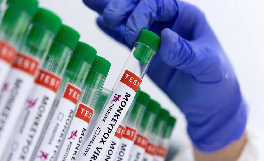Kerala confirmed its second case of Mpox (monkeypox) on Wednesday. A 38-year-old man from Malappuram tested positive after returning from the UAE. He is now isolated and receiving treatment as per medical guidelines. Health Minister Veena George urged the public to seek treatment and inform health authorities if they show symptoms.
India’s First Mpox Case
India’s first Mpox case was reported nine days ago in Delhi. A young man who traveled from West Africa tested positive. He is also stable and isolated to prevent the virus from spreading.
No Widespread Public Risk
The government has reassured that there is no significant risk to the public. Tests showed the presence of ‘clade 2,’ a strain of the virus similar to cases reported in India since July 2022. This strain is not part of the public health emergency declared by the World Health Organization (WHO), which warned about ‘clade 1.’
Government Directives
Last week, the government instructed all states and union territories to check their preparedness, especially in healthcare facilities. Healthcare workers in skin and sexually transmitted disease (STD) clinics are being trained to recognize Mpox symptoms and act quickly.
The government also emphasized the need to avoid panic, while ensuring the public is informed about Mpox symptoms. According to WHO, most patients are men aged 18-44 and experience a rash followed by fever. Mpox spreads primarily through sexual contact and person-to-person non-sexual contact.
Mpox Overview
Mpox infections usually last 2-4 weeks, and most patients recover with basic medical care. The virus spreads through prolonged close contact with an infected person and shows symptoms like fever, rash, and swollen lymph nodes.
WHO Declares Public Health Emergency
In July, the WHO declared Mpox a Public Health Emergency of International Concern due to its spread beyond Africa. Over 120 countries have reported more than 100,000 lab-confirmed cases and 220 deaths between January 2022 and August 2024. WHO has also advised that vaccines can help prevent infection, especially if administered within four days of exposure.


